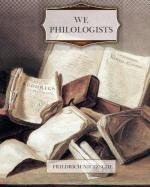In short, ninety-nine philologists out of a hundred should not be philologists at all.
3
The more strict religions require that men shall look upon their activity simply as one means of carrying out a metaphysical scheme: an unfortunate choice of calling may then be explained as a test of the individual. Religions keep their eyes fixed only upon the salvation of the individual . whether he is a slave or a free man, a merchant or a scholar, his aim in life has nothing to do with his calling, so that a wrong choice is not such a very great piece of unhappiness. Let this serve as a crumb of comfort for philologists in general; but true philologists stand in need of a better understanding: what will result from a science which is “gone in for” by ninety-nine such people? The thoroughly unfitted majority draw up the rules of the science in accordance with their own capacities and inclinations; and in this way they tyrannise over the hundredth, the only capable one among them. If they have the training of others in their hands they will train them consciously or unconsciously after their own image . what then becomes of the classicism of the Greeks and Romans?
The points to be proved are—
(a) The disparity between philologists and the ancients.
(b) The inability of the philologist to train his pupils, even with the help of the ancients.
(c) The falsifying of the science by the (incapacity of the) majority, the wrong requirements held in view; the renunciation of the real aim of this science.
4
All this affects the sources of our present philology: a sceptical and melancholy attitude. But how otherwise are philologists to be produced?
The imitation of antiquity: is not this a principle which has been refuted by this time?
The flight from actuality to the ancients: does not this tend to falsify our conception of antiquity?
5
We are still behindhand in one type of contemplation: to understand how the greatest productions of the intellect have a dreadful and evil background . the sceptical type of contemplation. Greek antiquity is now investigated as the most beautiful example of life.
As man assumes a sceptical and melancholy attitude towards his life’s calling, so we must sceptically examine the highest life’s calling of a nation: in order that we may understand what life is.
6
My words of consolation apply particularly to the single tyrannised individual out of a hundred: such exceptional ones should simply treat all the unenlightened majorities as their subordinates; and they should in the same way take advantage of the prejudice, which is still widespread, in favour of classical instruction—they need many helpers. But they must have a clear perception of what their actual goal is.
7




